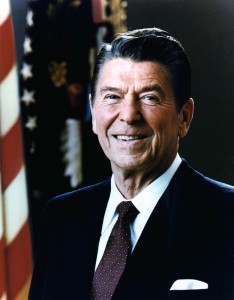
Sunday, Feb. 6 marks what would have been Ronald Reagan’s 100th birthday, had he not succumbed to Alzheimer’s disease in 2004. Many conservative Americans will treat Sunday as a special day, since Reagan was, and remains, the most dynamic Republican president since Dwight Eisenhower. Indeed, some neoconservatives want to put Reagan on the $50 bill. Others want to put him on Mount Rushmore and every current GOP politician gives lip service to being a “Ronald Reagan conservative.” As such, it’s worth asking — was Reagan a great president?
The usual case for Reagan’s greatness, according to conservatives, goes as follows: he lowered taxes, saving the economy from recession. He shrank the size of government. He defeated the Soviet Union and won the Cold War. He restored the prestige of the military and made people believe in America again. This hagiographed presidency sounds terrific, but his actual legacy is more nuanced.
Reagan’s desire to cut taxes was admirable, but his lowering taxes on the wealthy and deregulating big business led to egregious excesses on Wall Street, resulting in the near-recession of the early 1990s. Furthermore, Reagan’s resolute belief in keeping taxes low, even as he ramped up arms production, forced the government into deficit spending, even as his financial advisors begged him to change course. Even though many neo-cons swear Reagan never raised taxes, he finally needed to, though he hid the tax increase behind impenetrable “tax reform” rhetoric. To be fair, for all his wonky fiscal policies, Reagan did preside over economic recovery. It’s just that the economy plummeted again within a few years, implying that the wondrous 1980s boom had less to do with Reaganomics and more to do with cyclical economic patterns.
The Reagan years did not see a marked reduction in government size, but neither did it see a massive expansion of government. The bureaucracy remained constant, even as tax revenues plunged and spending soared. However, following his assassination attempt, Reagan gradually became less involved — and less interested — in the minutiae of the Executive Branch.
Consequently, his advisors grew almost too powerful. It is quite possible that Reagan did not or chose not to know about the Iran-Contra Scandal, even as his closest aides cut illegal deals.
Was Reagan already suffering from Alzheimer’s disease during his presidency? His biographers are split on it, and I am not informed enough to make a judgment. Regardless, Reagan’s inattention to detail and lack of control over his staff was irresponsible.
Still, Reagan achieved some great things. His arms program unbalanced the federal budget, and he stubbornly walked away from denuclearization talks with the Soviets, but his hard line against Communism helped bring down the autocratic USSR. By befriending Mikhail Gorbachev, Reagan even showed he was willing to moderate his anti-Communist feelings.
The president’s constant display of respect for Americans in uniform helped restore the military’s reputation in the wake of Vietnam. Finally, his eternal optimism and simple faith that America represents righteousness restored Americans’ hope for a better future, which had seemed impossible following the tumultuous ‘70s.
For his deeply conservative beliefs and victory in the Cold War, Reagan is clearly one of the most significant presidents of the last century. However, his economics platform was deeply flawed, and Iran-Contra and other administrative scandals leave disturbing questions about Reagan’s control of his own government.
The 1980s are usually described in nostalgic terms of American values and financial prosperity, but such idealized rhetoric unnecessarily obscures the faults of Reagan’s presidency.
Reagan may have done a relatively good job in office, but he is not equal in stature to the men already on Mount Rushmore.




